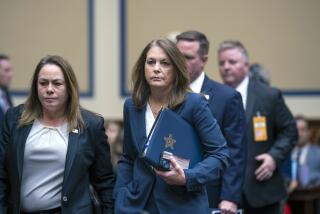NSA seeks to stop leaks following Edward Snowden case
ASPEN, Colo. — The National Security Agency is taking steps to address glaring weaknesses that allowed former contractor Edward Snowden to access and remove large volumes of top-secret information, a senior Pentagon official said Thursday.
“This failure originated from two practices that we need to reverse,” Deputy Defense Secretary Ashton Carter said at a security forum at the Aspen Institute.
“In an effort for those in the intelligence community to be able to share with each other, there was an enormous amount of information concentrated in one place,” he said. “That’s a mistake. Loading everything onto a server creates a security risk.”
Second, he said, “You had an individual who was given very substantial authority to access that information and move that information.… We’re acting to reverse both of those things.”
PHOTOS: 2013’s memorable political moments
Carter said the NSA was moving to a system under which no single person could move large amounts of sensitive data without another person signing off, an arrangement common to nuclear weapons controls.
The Snowden disclosures of NSA surveillance systems were a prime topic at the Aspen Security Forum, which features a series of panel discussions by current and former intelligence officials. Snowden, charged with violating the Espionage Act, has been stuck in the international zone of a Moscow airport since June 23, and has asked for temporary asylum in Russia.
Among Snowden’s revelations was that the NSA had assembled a giant database of telephone calling logs of nearly every American.
Raj De, the NSA’s general counsel, said Congress was fully briefed on that program through classified “white papers” sent to lawmakers in 2009 and 2011. In recent weeks, some lawmakers have said they do not believe the Patriot Act allows such a broad collection of domestic records.
De and other current and former government officials defended the surveillance as narrow, legal and useful. Under questioning from reporter Barton Gellman, who wrote about some of the Snowden disclosures for the Washington Post, Dennis Blair, the former director of national intelligence, argued there was no evidence of abuses or Americans being wrongfully targeted.
Americans have been more inconvenienced by having to take off their shoes at airports than they have by NSA snooping, Blair said.
PHOTOS: Team Obama, where are they now?
“I would be more outraged if I had found a story in which the activities of the NSA have caused inconvenience or harm or damage to an American,” he said. “I have not seen that story yet.”
Anthony Romero, executive director of the American Civil Liberties Union, said Snowden had done the country a service by forcing a debate on surveillance programs that had been kept from the American people. Current and former US intelligence officials disagreed, but Blair said he wished the U.S. government had disclosed some of the surveillance in general terms years ago.
“If we had more fully explained these programs … I think we would be in much better-off shape,” Blair said. “As it is, we are whipsawed by revelations … that make it appear as if we have much more to hide.”
Twitter: @kendilanianLAT
More to Read
Get the L.A. Times Politics newsletter
Deeply reported insights into legislation, politics and policy from Sacramento, Washington and beyond. In your inbox three times per week.
You may occasionally receive promotional content from the Los Angeles Times.











